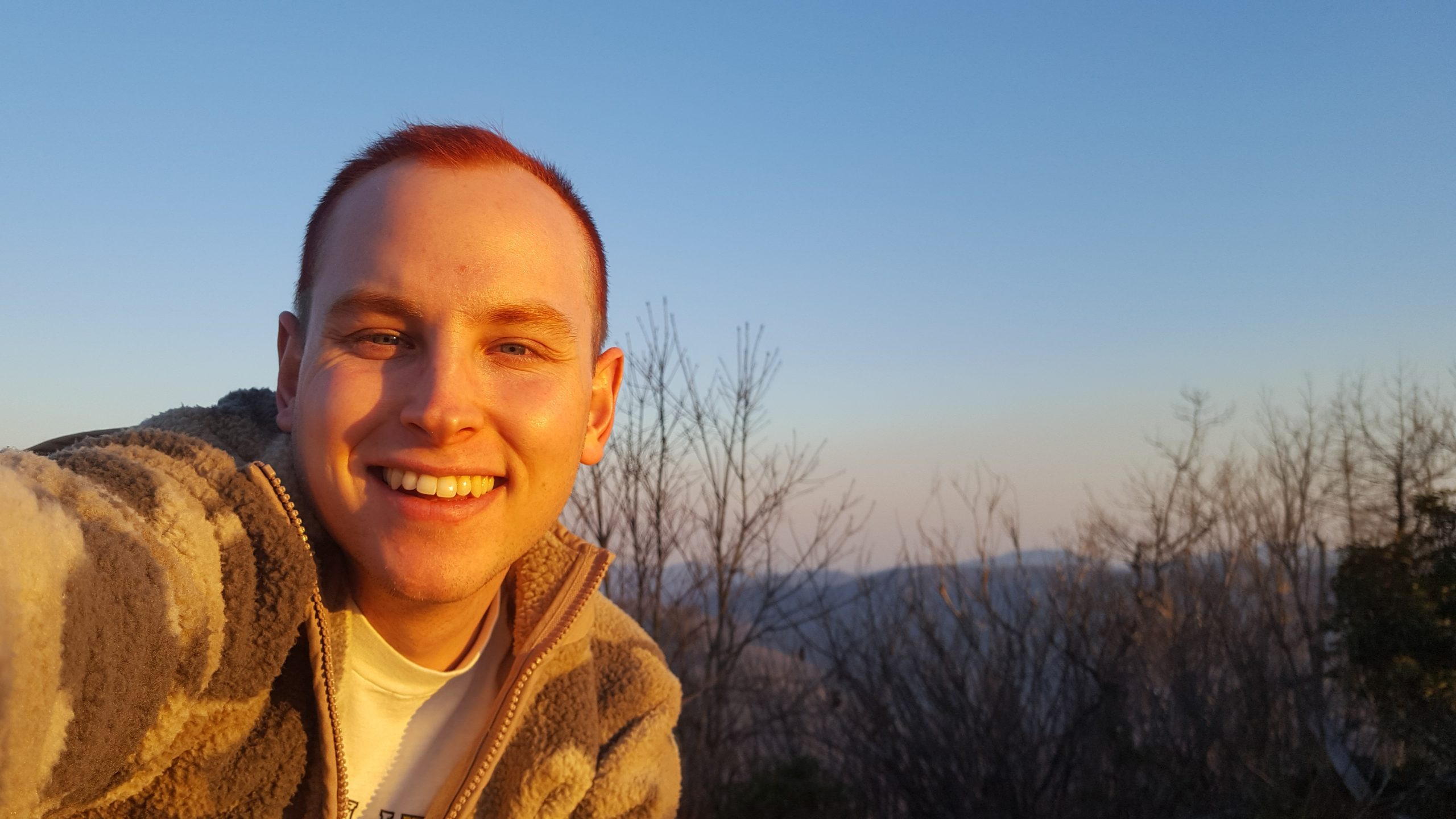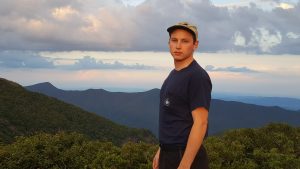Researcher Spotlight – Andrew Shannon

2021-22 Global Change Fellow
PhD student, Center for Geospatial Analytics
Advisor: Dr. Robert Scheller
Every year the Southeast Climate Adaptation Science Center funds a multi-disciplinary cohort of Global Change Fellows representing colleges across NC State University. The current cohort of students represents the decadal anniversary of this program! Here are some highlights about 2021-22 Fellow, Andrew Shannon, and the applied research he’s conducting.
About You
What do you study?
My research group explores questions of landscape-scale ecological processes from a variety of modeling approaches. We focus largely on forested landscapes, and within this group, I study forest management efforts in the Southern Appalachians. I am interested in the long-term impacts of management practices on carbon storage, drought resilience, and fire regimes in the region. The Southern Appalachians contain high biodiversity and represent a heterogenous mosaic of land ownership types and management goals. These aspects present many research questions on the interactions between natural and anthropogenic disturbances, climate change, forest ecology, and land use. Through my studies, I am excited to simulate these interactions and understand future scenarios of forest composition and function in the Southern Appalachians.
What is your dream job?
Whatever the job environment may be, I want to contribute to co-production efforts for community and regional-scale climate adaptation plans. As I pursue a degree in geospatial analytics, I aim to be a technical resource for people in the field who are leading and implementing mitigation and adaptation plans. My ideal role will provide those managers, stewards, and community leaders with the actionable interpretation and synthesis of data that they need for long-term, scenario-based planning.
What (or who) influenced you to go into this field of study?
There are several people and organizations that influenced me to work in this field of study. Mentors from the AmeriCorps and NASA Capacity Building Program introduced me to the concept of co-production for research and partnership building. I was able to participate in such efforts when interacting with other ecology and climate researchers working in the Southern Appalachians, a place that I’ve been lucky to call home. When I learned that the SE CASC, as well as my research group with the Dynamic Ecosystems and Landscapes Lab, were hubs of that kind of partnership-based research, I knew pursuing this field of study here at NC State had to be my next step!
About Your Research

What is the most important thing that you’ve learned?
Even over the course of this first year in my research process, my knowledge of ecological modeling and the co-production of applied research has grown exponentially. I’ve learned how important it is to connect with the people doing field-level work in the landscapes that I am simulating. They have firsthand knowledge of the ecological processes taking place at the study sites and can offer integral considerations for representing these processes in the model. Forming relationships with the field researchers and managers is key in understanding the needs they have for interpreting and using model results. They give real context to the patterns we observe in the simulations, so that my research efforts can be actionable.
How can your research be used to inform management decisions?
Currently, my research focuses on simulating the impacts of silvicultural practices designed to address concerns of declining oak tree regeneration in the Southern Appalachians, specifically in the Bent Creek Experimental Forest. Forest Service managers there are interested in projecting how their efforts in experimental sites will change the species composition, carbon storage, and drought tolerance of the forest decades in the future. These results will demonstrate the degree to which the treatments will meet their long-term management goals.
How would you describe your research to a 3rd grader?
Think of your favorite park or outside space with trees. It probably didn’t always look that way! Someone had to plant the trees and create the space for them to grow over time. I study the ways people make changes to outside spaces so that certain trees can grow better than others. If I know what they plan to do, I can try to predict how the trees will grow in the future.
About Your Global Change Fellow Experience
How do you expect the SE CASC Global Change Fellows Program to impact you and your work?
The Global Change Fellows Programs emphasizes the importance of thoughtful and creative science communication. Through workshops with communication experts, the fellows have gotten to learn about a range of topics including storytelling, visualization, cultural competency, and team science. With the support of the SE CASC, I can use these tools to enrich my research and promote my work to audiences through channels beyond peer-reviewed publications. I hope to apply these lessons in science communication throughout my career so that I can better connect with planners, managers, and other community members.
What has been the most rewarding part of being a Fellow?
Getting to have small group conversations with researchers across disciplines who are studying an array of systems in the Southeast United States and beyond has been wonderful. I feel knowledgeable of and connected to people and organizations performing such important work in the climate adaptation space. Thanks to the weekly seminars, I am empowered to interact with other researchers, and I can now imagine so many ways in which my career could unfold.
What advice would you give to a student that is interested in getting involved in your field?
In terms of ecological modeling, I would advise a student to reflect on which pieces of the puzzle interest them the most. Do you like investigating the foundational ecology research that informs and improves the theoretical processes driving the models? Do you like figuring out how to develop programs and apply statistics that best represent those processes? Do you like connecting the research and modeling experiments to actionable information for managers and communities? Use your time as a student to identify the relevant skills and knowledge you need to contribute to these research efforts.
